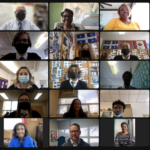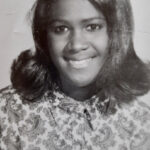Cheryl Johnson was born July 3, 1951 in Batesville, Mississippi. She grew up on a farm in a rural community, during the era of Jim Crow. Her family owned the land, and they grew cotton, corn, watermelons, sugar cane, and had their own garden, fruit trees, cows, pigs, chickens, and dogs. Her family also grew peanuts, Irish and sweet potatoes and slaughtered their hogs and chickens, and canned, froze, and smoked food to last year round. She remembers that her community was interdependent, and that danger and hostility lay outside the boundaries of the community and that they rarely ventured outside unless it was absolutely necessary. Cheryl went to school in 1956, two years after the landmark Brown v. Board of Ed. decision. She started school in a local all-Black Rosenwald School, and later transferred to an all Black school – West Side Elementary. In 1964 Panola County was still pursuing a strategy to continue with segregated schools. But Cheryl came of age in the heady days of the mid-60s, and as a young girl she witnessed Mississippi’s Freedom Summer. Inspired by those events, in 1966 Cheryl and her siblings made the choice to attend the integrated Batesville High School. They would face hostility, harassment, and threats of violence at their new school – from students and teachers. Even her family home came under attack, as someone shot up the house, a crime for which there was never an arrest or prosecution. In school the racism continued as Black students were not invited to the prom, which was scheduled as a “private” event. Cheryl and other Black students protested and went anyway, only to be barred at the door. Cheryl went on to attend Howard University, and spent her working life in education and at the Department of Justice, raising her family along the way. We were introduced to Cheryl by Alice Pretlow, who spoke with the American History class in 2021; Cheryl visited the Social Justice and Equity class in 2022 with her friend Gloria Tucker, where students had the chance to zoom with the ladies, and to hear about their lives and ongoing determination and involvement in the fight for racial justice.
Videos
Click next video below to keep watching


